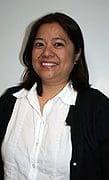

Although my position is Manager of AHS’ Billing Department, for the last 17 years I have been assisting Filipino patients who encounter problems with program benefits and eligibility for services or face financial difficulties and billing issues. I also do interpretation during their medical visits.
The challenges faced by Filipino patients are varied. Here is some of what I’ve learned through the years:
Most of our Filipino patients do not want to seek a doctor until they feel their condition is acute or they have a chronic illness. They get by through taking medication from the Philippines. It is not unusual for friends and family to share their prescription medication with each other. One patient I interpreted for has diabetes and hypertension. Just because his parents have the same illness, he thought it was okay for him to use his parents’ medication. He did not think it necessary to see the doctor until he felt his condition had become acute. I often encounter 40- to 64-year-old Filipino patients whose income levels are seemingly above the FPL but face financial difficulties in meeting copayments. In the course of working with them, I would find out that they are supporting families they have left behind in the in the Philippines. They, therefore, seek medical care only if they consider it urgent or necessary. Many of the patients facing this type of situation take medication they get from the Philippines.
For Filipinos who do not have legal permanent resident immigration status, it’s a major burden for them to seek medical care. There are very limited programs they can qualify for and if they do, they usually hesitate to participate because they are afraid that this might cause them to get deported back to the Philippines.
Another patient did not understand how her Medicare and MediCal coverage works. She refused a cataract surgery because she was afraid Medicare would find the procedure unnecessary and penalize her for it. She refused to have a screening colonoscopy and abdominal CT for the same reason. In interpreting for her, I learned she feared that Medicare and MediCal would cut her off for having procedures that cost so much. Without AHS working to ensure that the patient’s language and cultural beliefs are understood, the medical care of a patient like her will be seriously compromised.
It is generally assumed even in the community health centers that since Filipinos are able to understand English, they do not need any extra enabling steps or systems to assure their access to medical care. Yet, I have found in the last 17 years that many Filipino patients do not fully understand the conversation in English with their doctor. The elderly oftentimes don’t understand the doctor’s recommendations and instructions, so they leave the clinic intending not to be back for any follow-up appointment.
Positions dedicated to interpretation/navigation for Filipinos cannot be taken for granted in the community health center setting.
